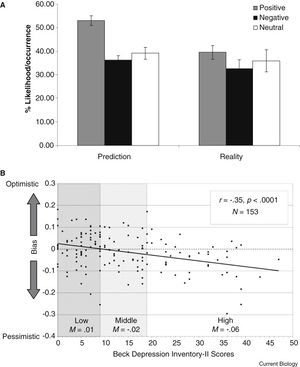Optimism bias: Difference between revisions
mNo edit summary |
mNo edit summary |
||
| Line 1: | Line 1: | ||
'''Optimism bias is a cognitive bias that causes [[We|us]] to believe that they themselves are less likely to experience a negative event. Evidence, indicates that most people have ingrained optimism biases and that too much optimism is detrimental to mental health<ref>'''Hope, optimism and delusion'''. Psychiatr Bull (2014). Rebecca McGuire-Snieckus1 2014 Apr; 38(2): 49–51. doi: 10.1192/pb.bp.113.044438. Accessed on 22nd August 2022, via https://www.ncbi.nlm.nih.gov/pmc/articles/PMC4115405/</ref>. The evolutionary psychology reasoning as to why the bias exists is that early humans had to risk their lives every day. If they were acting on pure rationality our line would have starved to death. | [[File:Optimism bias.jpg|alt=Optimism bias|thumb|'''Figure 1'''. Optimism bias, is proven by looking at predictions versus subsequent reality.]] | ||
'''Optimism bias is a cognitive bias that causes [[We|us]] to believe that they themselves are less likely to experience a negative event. Scientists have shown this in multiple studies'''<ref>'''The optimism bias.''' Tali Sharot. PRIMER| VOLUME 21, ISSUE 23, PR941-R945, DECEMBER 06, 2011. DOI:<nowiki>https://doi.org/10.1016/j.cub.2011.10.030</nowiki></ref> '''showing that students expect to receive higher starting salaries and more job offers than they end up getting. People tend to underestimate how long a project will take to complete and how much it will cost. Most of us predict deriving greater pleasure from a vacation than we subsequently do, and we anticipate encountering more positive events in an upcoming month (such as receiving a gift or enjoying a movie) than we end up experiencing (Figure 1).''' | |||
Evidence, indicates that most people have ingrained optimism biases and that too much optimism is detrimental to mental health<ref>'''Hope, optimism and delusion'''. Psychiatr Bull (2014). Rebecca McGuire-Snieckus1 2014 Apr; 38(2): 49–51. doi: 10.1192/pb.bp.113.044438. Accessed on 22nd August 2022, via https://www.ncbi.nlm.nih.gov/pmc/articles/PMC4115405/</ref>. The evolutionary psychology reasoning as to why the bias exists is that early humans had to risk their lives every day. If they were acting on pure rationality our line would have starved to death. | |||
Death is the ultimate risk for humans. However, we need to do it, however if we thought about it too much we would not do anything. This is why medicine is so expensive in US and has to be socially administered in the majority of civilised countries. The greatest product you can see someone is the fear of death. The optimism bias has to exists otherwise nothing would be done. | Death is the ultimate risk for humans. However, we need to do it, however if we thought about it too much we would not do anything. This is why medicine is so expensive in US and has to be socially administered in the majority of civilised countries. The greatest product you can see someone is the fear of death. The optimism bias has to exists otherwise nothing would be done. | ||
Revision as of 06:11, 22 August 2022
Optimism bias is a cognitive bias that causes us to believe that they themselves are less likely to experience a negative event. Scientists have shown this in multiple studies[1] showing that students expect to receive higher starting salaries and more job offers than they end up getting. People tend to underestimate how long a project will take to complete and how much it will cost. Most of us predict deriving greater pleasure from a vacation than we subsequently do, and we anticipate encountering more positive events in an upcoming month (such as receiving a gift or enjoying a movie) than we end up experiencing (Figure 1).
Evidence, indicates that most people have ingrained optimism biases and that too much optimism is detrimental to mental health[2]. The evolutionary psychology reasoning as to why the bias exists is that early humans had to risk their lives every day. If they were acting on pure rationality our line would have starved to death.
Death is the ultimate risk for humans. However, we need to do it, however if we thought about it too much we would not do anything. This is why medicine is so expensive in US and has to be socially administered in the majority of civilised countries. The greatest product you can see someone is the fear of death. The optimism bias has to exists otherwise nothing would be done.
- ↑ The optimism bias. Tali Sharot. PRIMER| VOLUME 21, ISSUE 23, PR941-R945, DECEMBER 06, 2011. DOI:https://doi.org/10.1016/j.cub.2011.10.030
- ↑ Hope, optimism and delusion. Psychiatr Bull (2014). Rebecca McGuire-Snieckus1 2014 Apr; 38(2): 49–51. doi: 10.1192/pb.bp.113.044438. Accessed on 22nd August 2022, via https://www.ncbi.nlm.nih.gov/pmc/articles/PMC4115405/
